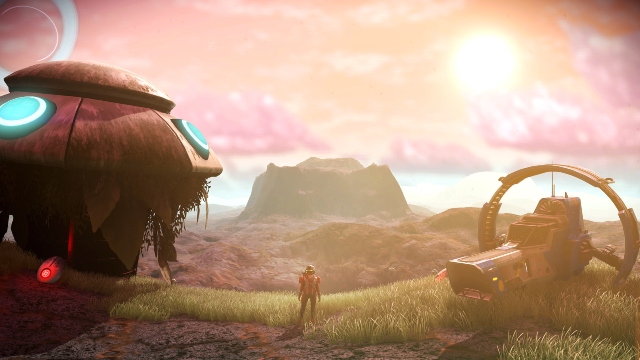At the Develop:Brighton conference today in Brighton, England, No Man’s Sky Director Sean Murray explained the company’s decision to avoid talking to journalists following the game’s divisive release. According to Murray, Hello Games wanted to focus on making significant improvements to the game before communicating with anyone and wanted to communicate directly with the community before ending the No Man’s Sky media silence.
Murray, speaking onstage at Develop:Brighton (via GamesIndustry.biz), recommended other developers follow the same strategy after a rough launch.
ALSO: GameStop VP isn’t concerned by the rapid growth of digital sales
“If you want to communicate with [the community], then […] you’ve got to release something,” Murray said. “How quickly can we get an update out? What can be in it, and what do we want to say with this?”
According to Murray, the media silence lasted about two years, and the team didn’t talk to the game’s community at all for about three months of that period. When Hello Games did talk, it was directly to fans through updates and patch notes. Murray said he came to this decision, in part, because he believes games journalism’s place in the industry isn’t what it used to be. In games journalism’s early days, it was the main channel for communication between developers and their fans. Now, it’s much easier for developers to do that directly, meaning games journalism is often more reactionary.
“[T]he press when I was growing up was kind of the [hub] of the community,” Murray said. “What they wrote, I would read, and […] I would just be led by what that journalist had said. […] I think that the problem with what we see on front pages being led by what we click on means that naturally you tend to read what the most people clicked… which means the press is naturally downstream from the community.”
Murray also said talking to games media in the time before No Man’s Sky‘s launch gave him a skewed perception of how his words would be interpreted. Since people like games journalists have a better understanding of the industry and how game development works, he said, he approached conversations with them in a way he wouldn’t necessarily approach conversations with any random person who ended up purchasing No Man’s Sky after only ever seeing a “30-second” video of it.
Murray said (via GamesRadar) he’s seen companies like Bethesda with “polarizing” game launches (like Fallout 76) try to salvage the situation with words, reaffirming his update-first strategy.
“I can see EA, Microsoft, or Bethesda try to placate players by just talking to them,” Murray said, “but for right or wrong, it just doesn’t really work. You see this all the time when a big publisher will talk to the community and try to solve the problem and then get embroiled, taking up more and more of its head space.”
Murray initially tried to do the same, he said, drafting blog post after blog post in order to explain Hello Games’ decisions, but he knew that it wouldn’t “hold any credibility” because of the game’s public perception at the time.
Murray said he wishes there was more games journalism “where people talk freely and educate people about game development” in order to lessen the disconnect between the average consumer’s expectations and the realities of development — especially for a small team like that of Hello Games. However, while learning about game development can be beneficial to all involved and more empathy is a good thing, many people were frustrated because of what he specifically said about the game that ended up not being true. Judging by his own words, if he had been more up front about the realities of game development and didn’t state some of the missing features as surefire things, people might not have been so harsh and expected so much.
The No Man’s Sky NEXT update, released in 2018, overhauled much of the game’s systems, gave it multiplayer, and generally brought it closer to what fans initially expected the game to be, leading to a huge jump in player numbers. The game has also been frequently updated with additional features and events since then.







